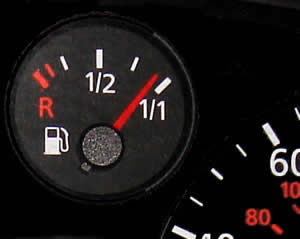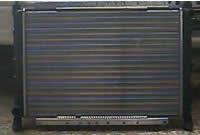Tuning the cars engine for better MPG means reducing power.
"Tuning for Stingy people"
Tuning for better MPG.
Tuning for economy. With the rising price of fuel one question TorqueCars frequently gets asked is how can a car be tuned for maximum economy. Short of getting the family to push the car everywhere there is a little that can be done to improve fuel economy.

First off you need to see if your car is operating within normal parameters. So get your makers stats out and work out if you are getting the right fuel consumption to start with. (Your driving habits and use of air conditioning may also be partly to blame so take the diving boot of the right foot and affix a helium balloon.)
Baseline factors for consideration.
First off we need to rid ourselves of problem areas that can rob us of fuel economy. You need a good strong spark to ensure that the engine burns the fuel effectively. Clean plugs are an essential so regularly ensure that any glazing is removed from the electrode tips, all leads and hi-tension electrics need to be in perfect working order.
The fuel system also needs to be in tip top condition. Over time, on injection engines, the injectors - the little nozzles that spray the fuel into the engine become silted up. Instead of spraying a fine mist of fuel into the combustion chamber, which would burn very well, it squirts a jet of fuel which sits in the bottom of the cylinder and much fuel is wasted.
The addition of an injector/carb cleaner and use of high quality fuel will help with this problem but on an older car it is worth considering fitting new injectors. A simple compression test will reveal much about the condition of the engine and it efficiency. An engine which loses combustion pressure will not be efficient. The cost of the work to correct the faults outlined above may well be more than covered by the fuel savings over the next year or so.
Regular checks
Tyre pressures should also be checked as a 15psi drop in just one tyre can rob you of 2-4 mpg at slow urban speeds!!! This gets even worse if all 4 tyres are under inflated. Are all of the sensors (temp, airflow, Lambda, idle speed etc) working correctly? Less obvious but important none the less is to check the hoses in the engine bay for air loss - a vacuum loss can cause high idling and other combustion issues. You also need to ensure that the air filter is clean and in good condition. Roof racks and open windows (at speeds over 30 mph) will take another 5 mpg or so from your economy again depending on driving style and speeds.
Tuning tips
Now moving on to the tuning tips. When making a car more powerful you lose fuel economy because you are burning more fuel and pulling more air into the engine so the reverse is also true - less power means more economy but you need to maintain the most efficient engine.
 Things we do to make our cars faster can also be used (and sometimes reversed) to get better economy. The overall aim should be to improve the efficiency of the engine whereas in performance tuning we generally increase the engines capacity to burn fuel as well as making it more efficient. As each engine is different there is not a one size fits all approach.
Things we do to make our cars faster can also be used (and sometimes reversed) to get better economy. The overall aim should be to improve the efficiency of the engine whereas in performance tuning we generally increase the engines capacity to burn fuel as well as making it more efficient. As each engine is different there is not a one size fits all approach.
Generally speaking getting the head gas flowed and improving the combustion cycle of the engine will make the car more economical as it is running more efficiently. The larger the capacity of the engine the more effective this is. Paying careful attention to the area around the intake valves especially by introducing 3 or 5 stepped angles can improve economy by maximising the air flow into the engine and allowing better fuel/air mixing as it enters the cylinder.
A lighter flywheel will also further reduce the rotational mass of the engine and free up some economy. It is worth noting that on long motorway journeys and hills some have reported lower fuel economy with a lighter flywheel.
Modifications to be removed/reversed
Modifications such as adding larger fuel injectors and bigger valves will usually result in an increased power gain rather than greater efficiency. Sometimes though the aim of performance tuning is purely to burn more fuel and this will deny you the fuel economy you seek stick with mods that improve efficiency instead. Wide tires and big wheels mean big rotating mass, which take more energy to accelerate and this applies to heavy wheels so stick with some light weight alloys wheels. Wide tires also generally have higher rolling resistance which also decreased fuel economy so once again get things back to the manufacturers base figures.
Particularly in smaller capacity European cars (1.0-1.6), which are fairly efficient to start with, you should look at undoing the modifications you have applied for power gains. So if you have fitted a large bore (read MASSIVE!) sports exhaust to increase the power of the engine you should consider replacing this with a slightly smaller bore exhaust roughly similar to or only slightly larger than the makers specifications. This will get the air flow back in line with the designed characteristics - back pressure is not a bad thing!
Changing the spark timing will also help to make the burn cycle of the engine more efficient. In modern cars the only way this can be achieved is via a remap of the computer. If you have fitted an induction kit to increase air flow to the engine then you need to consider restricting the air intake by swapping back to a standard air box and perhaps using a panel filter. Basically if you reverse the power tips you have applied to your car to encourage it to burn more fuel you will have found some economy tips! Taking the theory a little further, for urban speeds mainly, - the hotter the intake air the less oxygen it carries and the less fuel will be burnt as the fuel to oxygen mix is carefully maintained.
Other simple modifications to improve economy
Putting a warm air feed to take air from behind the radiator or better still just under the branches of the exhaust manifold will do much to increase urban fuel economy at mid to light throttle settings.
You probably notice that your car is a few MPG better off in the summer compared to the middle of winter but the car seems much faster and more responsive in the Winter. This is due to the high air intake temperature and the fact that the engine is running a little hotter. Hotter engines are more efficient and just raising the rating of the thermostatic valve that controls the cooling system by a couple of degrees can improve fuel consumption.
Fitting a new clutch can help maximise the power delivery and reduce 'transmission loss'. On cars with a couple of cooling fans in them you can wire one up to a switch which you manually throw if you see the temperature of the engine rising.
Re mapping the ECU is possible and on turbo models a fairly substantial fuel saving can be had but few people actually ask for an economy remap - some companies offer remaps which give better economy at low revs and more power at higher revs but this seems to balance out as we tend to enjoy the power bit regularly.
We have also seen some of our members blocking off part of the radiator in winter to improve economy. In the middle of winter car engines take a lot longer to reach operating temperature and often the engine runs slightly cooler than is ideal so drivers can mask off part of the radiator which ensures the car gets up to operating temperature as quickly as possible this is best done with a heavy grade foil but you must always leave the area behind the fan free otherwise the car will overheat and if it does you will kill the engine.
Warm engine temps also promote vaporization of large fuel droplets that stick to engine surfaces or that are produced by poor quality or maintained injectors. It is also worth checking the alignment of the wheels as a misaligned wheel can create major drag. Use our MPG calculator to see how you are doing with your fuel economy.
Please also join us in our friendly forum to discuss fuel saving tips in more detail with our members.
If you liked this page please share it with your friends, drop a link to it in your favourite forum or use the bookmarking options to save it to your social media profile.
Check out TorqueCars new YouTube channel, and see their awesome new content...
Feedback
Please use our forums if you wish to ask a tuning question, and please note we do not sell parts or services, we are just an online magazine.
Help us improve, leave a suggestion or tip
